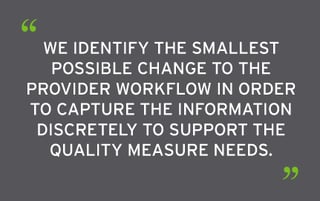While the state drink of Wisconsin is officially milk, many adults would argue that it's actually the brandy old fashioned (warning: slight rabbit hole with the history in that link). Now, if we offered you a nice Wisconsin brandy old fashioned (after 5 p.m., of course) and asked you to divide it back into the five ingredients that make the drink, you’d probably look at us like we were crazy. But that’s what meeting quality measures is like when all your information is stored in an unstructured blob.
The challenge? You need discrete data. (Think ingredients.) The next challenge? Making it natural for providers to record that data within the context of their normal workflows (i.e., while they’re mixing the drink). Working with Piedmont Healthcare, Nordic proved how an agile approach to meeting two particular quality measures not only worked for Piedmont's short-term physician quality reporting system (PQRS) and electronic clinical quality measures (eCGM) needs, but could also be applied to almost any quality measure they choose to tackle next.
 Piedmont Healthcare’s challenges
Piedmont Healthcare’s challenges
Piedmont Healthcare came to Nordic looking to meet the needs of the Piedmont Clinic, a clinically integrated network of physicians. At the time, Piedmont was unable to provide enough metrics to meet the regulatory requirements around an accountable care organization (ACO). Additional metrics were also needed to support eCQM and PQRS.
Goals, process, and (gasp!) alerts
Solving for regulatory requirements or quality measures starts with the basics: What are we trying to achieve? From there, we validate the necessary data to achieve those goals. This is where deep Epic expertise is extremely valuable. We understand how and why clinicians document care, listen to the nuances of each specialty, and ensure the key data elements are discrete to support reporting.
We identify the smallest possible change to the provider workflow in order to capture the information discretely to support the quality measure needs. This includes thoughtful consideration of numerators and — sometimes more importantly — the denominators to ensure the data is as clean as possible.
We also like meaningful alerts.
While the health IT press has been critical of alerts, the reality is that targeted alerts can be extremely effective in improving care. Let’s take an example from another project we’re working on. We're building an alert that says if all the following are true, then an alert will be triggered:
- The patient has suffered a stroke (there is documentation of a stroke)
- The patient has a documented diagnosis of AFib
- The patient does not have a discharge order for a statin for aspirin
- The provider hasn't written a contraindication, a reason why they're not going to order statin
- The patient is at the point of discharge
 This is not the type of alert that will cause the dreaded “alert fatigue.” No, this is the type of alert that will ensure you meet your quality measure compliance goals!
This is not the type of alert that will cause the dreaded “alert fatigue.” No, this is the type of alert that will ensure you meet your quality measure compliance goals!
Leveraging agile principles
Nordic’s approach is to listen, take that information to work up a quick prototype, incorporate feedback, iterate, and then deliver quickly. In the Piedmont Health success story, we delivered on their needs in under eight weeks.
“I think the end result that we built was more satisfying to the end user, which enhanced productivity," Piedmont CMIO Dr. Robert Budman said, "but also, very importantly, was the efficiency of gathering the data out of those metrics and being able to present them in a usable format … Clearly, we had a good working relationship with Nordic and would look forward to working at that level of professionalism again."
Listen to Salimah Handa, executive director of informatics, and Dr. Robert Budman, CMIO, on their experiences with Nordic on this Piedmont Healthcare project.
Transcript
Salimah: I'm Salimah Handa, executive director of informatics at Piedmont Healthcare.
Dr. Budman: I'm Dr. Robert Budman, the chief medical information officer from Piedmont Healthcare.
Salimah: One of the main drivers for us bringing Nordic in was an attempt to meet the needs of our Piedmont clinic. They're a clinically integrated network of physicians across primary care, as well as specialties, and one of their challenges is providing enough metrics so that we meet our regulatory requirements around an ACO. A challenge for us is meeting our measures from a regulatory standpoint, as well as providing enough metrics for that group.
That group had several measures that they wanted built out that our group wasn't necessarily able to support with our current resources, so we looked to bring Nordic in to assist us with that build, as well as optimize some of the other metrics that we had from an eCQM and PQRS claims-based build perspective, and they were able to help us come in and achieve that.
Dr. Budman: Before we took on the Nordic consultancy to establish this, we hadn't really had well defined working parameters for what we wanted to accomplish. Nordic really helped us focus on what the actual work product and end result had to be.
Salimah: We had a couple deep dive meetings with all of our team as well as their team president and were really able to get into the details of what we needed done pretty quickly. They were then able to go away, work pretty independently on the measures, and come back just periodically to check in with us and pretty much just validate they were on the right track, which they pretty much were the entire time. And then we ended up really accomplishing everything we had set out to do in a pretty fast timeline of seven to eight weeks.
Dr. Budman: When we kicked off the project with Nordic I was very impressed with the executive and management engagement, as well as the expertise of the folks they brought to partner with us. And in the long run, as we had regular meetings, it was really great to see the progress and get the feedback from the combined teams.
Salimah: Our Nordic project was a success for three reasons. One, we are now able to provide these metrics to the Piedmont Clinic so that they are able to offer them to any new providers that we may bring onboard, whether they are primary care or specialty. We are able to meet our requirements from a regulatory perspective because we now support claims based and eCQM build, as well as being able to use the framework that they provided when we are optimizing our metrics going forward.
Dr. Budman: I think the end result that we built was more satisfying to the end user, which enhanced productivity. But also very importantly was the efficiency of gathering the data out of those metrics and being able to present them in a usable format.
Salimah: We had a great experience with Nordic, really because I felt like we could be very open about what we were trying to accomplish. We already have projects in the works that we are definitely keeping Nordic in mind for, as soon as we get to the point where we're gonna use some outside help.
Dr. Budman: Clearly we had a good working relationship with Nordic and would look forward to working at that level of professionalism again.

